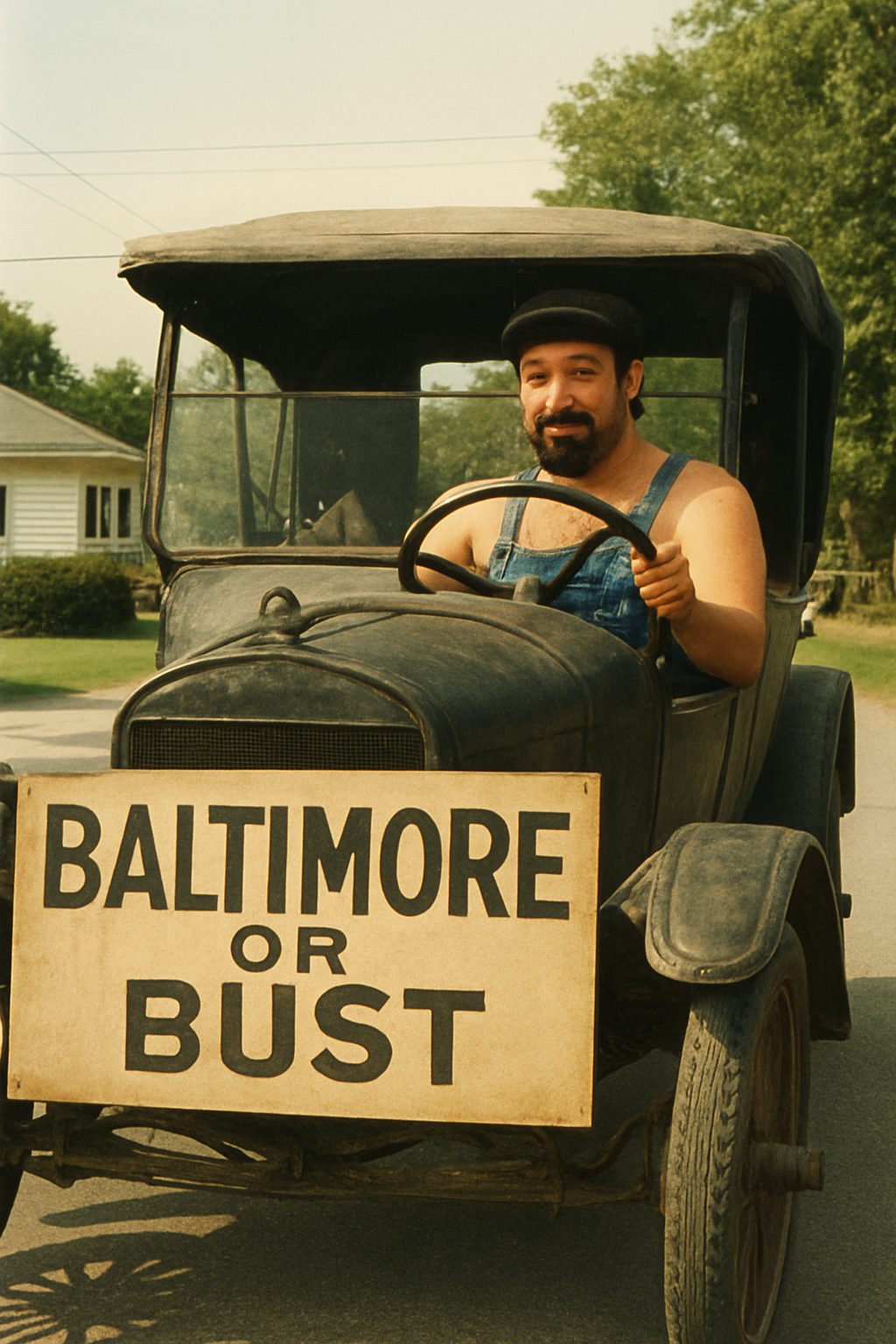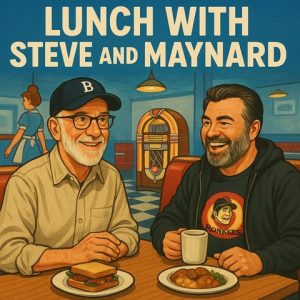We gave you the trailer to my new story about how I got to Baltimore. Here’s the whole story with the audition tape that got me the job included!
And now: Dreams Really Do Come True
My Father’s Zenith AM/FM shortwave radio, which I confiscated after a short term of non-use, was on my nightstand right next to my record player. My desk, where I allegedly did my homework, had a gooseneck lamp clamped on it. And these were all the tools I needed to manufacture my own radio studio. I sat at my desk, adjusted the lamp so the metal shade guarding the bulb was directly in front of my face, and then introduced the song on the 45 rpm record that was already spinning on my record player, placing the needle on the record. (gently) I tried to time it so there wasn’t too much “dead air” between the time I stopped talking and the music started playing.
From as far back as I can remember, I always dreamed of being on the radio in a big city. It seemed like that was all it ever could be—a dream. The little town where I grew up during the 1950s and 1960s was so far removed geographically from any large American city that it looked like I would have to be content with listening to my radio heroes nightly and continue to dream.
Living in northern NY state, north of the Adirondack mountains, near the St Lawrence River and Canadian border, I couldn’t pick up any of the great AM radio stations around the country during the day, but once the Sun went down, the scratchy sound with occasional interference of the 50,000-watt AM dial (clear channel) behemoths came in loud and clear.
Stations like WABC New York with cousin Brucie. WKBW Buffalo with Joey Reynolds and later Jackson Armstrong. Big Ron O’Brien and Larry Luchak on WCFL and WLS Chicago, and WBZ Boston with Larry Glick. These were the radio stations and voices I tuned into every night.
There wasn’t much chance I could ever become one of those guys. Heck, we didn’t even have a radio station in our town. That is, until July 14, 1964. It was exciting news. The station call letters were WIGS, 1230 on the AM dial. The local weekly newspaper, “The Gouverneur Tribune Press,” featured a major headline and story about the owners, announcers, and the format. This was big stuff!
It just so happened that the Beatles appeared on the Ed Sullivan Show earlier that year, which brought forth a local rock band, “The Echoes.” The Echoes consisted of three of my friends and me.
WIGS was doing quite well in our little town as the months and years went by. So were “The Echoes,” who morphed into “The Nightmen,” who morphed into “The East Branch.” Still, in high school, we were playing all across upstate New York. Then, the day came that would change my life forever, and I’m not talking about the day I spent with Judy Whalen in the tree house.
We received word that the radio station would like to invite our band to play live on air for an hour on a Saturday morning. We, of course, said yes! It was decided that I would be the one to talk about our band and introduce the songs that we were playing. When it was over, the radio station personnel thought the performance went very well, and so did we. The studio was on the second floor of a downtown building, so, as usual, there was a lot of carrying band equipment up and down stairs. Our drummer’s Mom had come to help us break down and transport the drums. I walked by her several times on the way to her car, carrying cymbals and foot pedals and attempting to make drumsticks look incredibly heavy. She stopped me on one of my trips and said, “Hey Steve, you really sounded good introducing the songs.” SHE SAID I SOUNDED GOOD INTRODUCING THE SONGS!!!!!
That was all I needed, and shortly after that, I began to hang around with a guy I had met who worked at the station. He worked the night shift, so without management or anyone else around, I was invited up almost every night. I learned how to run the control board and often did while he was on the air. I was familiar with the record library categories and system. I learned how to take transmitter readings. I learned how to clear the Associated Press news wire of what the station needed for news, sports, and weather. It wasn’t too long before I was hired for part-time on-air work. It was April 1969. I was a senior in high school. The following year, on May 11, 1970, I was hired full-time to host the night show that featured country music called “Country Fair Time.”
WIGS was a tiny little station, but it was run professionally by the owners, Morrie and Ann Genthner. During my four years there, I gained invaluable experience because I got to do everything. I worked all the on-air shifts. I wrote and read the news, and I covered the sports and weather. I did sports play-by-play. I recorded commercials. I did some sales and wrote commercial copy. (When we went off the air), I drove to the transmitter shack, and the regional engineer walked me through the steps needed to get us back on the air. Amazingly enough, I never got electrocuted one time!
One of the biggest lessons I ever learned there was that I couldn’t get high and do a show. Many on-air guys did and were fine; I was not. Happy Jack was the nighttime announcer, and I was doing the afternoon shift by this time. Nat Natali, the morning guy, was going on vacation. Management asked me to fill in for Nat, and Happy Jack would come in and do the news for the week.
Happy Jack came from Rochester, and by the time he had been at the station for six months, he and his wife had “turned on” half the town. Jack grew his own and may have had a side hustle, too.
The week we filled in on the morning show went smoothly until Wednesday. About 7 o’clock that morning, Jack came into my studio and said, “Hey man, do you wanna get high?” I replied, “Now?” “Yeah, it’ll be cool. Just put on a long record, we’ll go in the bathroom, take a couple of hits, and get right back to the show.” He said convincingly. I said, “ok.” (willpower)
What happened next could only be described as stoned chaos. I decided that Johnny Mathis, Frank Sinatra, and Tony Bennett records needed to be replaced immediately with Eric Clapton, The Guess Who, and the Rolling Stones. When I stopped for a commercial break, I couldn’t remember what commercials I had played, so I played them again, just in case. There was some girlish giggling between Jack and me during the news, sports, and weather. At one point, my mouth became so dry that my top lip stuck to my front teeth, making a clicking sound. It was so bad that listeners kept calling in, wondering if we were having technical difficulties as they kept hearing weird clicking noises on their radios. It was a mess!
Apparently, the husband/wife ownership team hadn’t been listening, as nothing was mentioned about the sudden format change upon their arrival at work. Jack and I felt fortunate and hungry. After the show, we dashed across the street to JJ Newberry’s, charged the lunch counter, and demolished two of their Big Boy Breakfasts.
Working there was a great start, and I loved it! There was a lot more to come as I left WIGS in an attempt to work my way up in the business. I was one of the first club jocks in the area when I was hired at a new college bar in Canton, NY, called “Skivvies.” I spent some time setting up one of the first local cable TV stations in the state in Potsdam, NY. I built the studios, hosted a music show, and was the weatherman on the local evening news. There were other radio stops in New York’s Finger Lakes region, Charlottesville, VA, Elmira, NY, and Bangor, Maine—all relatively small market stations. Keep in mind, none of these stations paid much, but I was having fun and learning more and more.
By the time I got to Bangor, I was 33 years old and loving the coast of Maine, where I lived. Still struggling to make ends meet, my girlfriend and I would drive the loop road in Acadia National Park on weekends in hopes of finding a car with a flat tire or some other malady. We always stopped to change a tire or give the stranded family a ride to get help, and inevitably got offered money that would help with groceries for the upcoming week.
My naturalist girlfriend also helped out in some unusual ways. One afternoon, I came home to something cooking in the kitchen. “Wow, that smells good! What is it?” I inquired. “I’m not sure,” she said. “I think it’s either a pheasant, quail, or maybe a partridge.” “You don’t know? How could you not know what you bought?” I said. “Where did you get it?” “On the road,” she said. “Somebody hit it right in front of me, so I stopped and picked it up!” “So we’re having road kill for dinner?” “Yup.” It had a slightly gamey taste with a hint of rubber, but overall, it wasn’t bad. If things got really tight, we often drove the few minutes over to the coastline and, with knives in hand, cut mussels from the rocks. It sounds pretty spectacular, and it was for a while, but after the thirty or fortieth time of bringing home our self-harvested mussels, we had had enough. After leaving Maine, I couldn’t touch a plate of mussels for years.
I had been in Maine for not quite a year when, one Sunday morning, my girlfriend asked me if I wanted to go to church with her. This was a fairly regular Sunday morning request that I regularly turned down. However, on this particular Sunday, I said yes, I would go. I don’t know what happened to me in that church service. I became so emotional about everything I was hearing, feeling, singing, everything! I had tears in my eyes for at least the last half of the service. Upon arriving home, I said I needed to take a walk alone. A few hundred feet from our rented house was a small pond in the woods. I stopped there, sat down on a log, and began a crazy conversation with myself that would drastically change the trajectory of my life. (Pivotal) I’ve often called this “My come-to-Jesus meeting.” I don’t know what it was, how long I was out there, or what the hell happened.
Talking out loud the whole time, I reviewed my life up to this point. I went through every emotion. I was laughing. I was crying. I was whispering. I was screaming. I was apologizing. I was disheartened, but mostly, I was trying to figure out what I needed to do. I couldn’t go on like this any longer. If you had happened to be hiding in the woods watching me go through this, you undoubtedly would have thought you stumbled upon an exorcism.
I loved radio, but I couldn’t make a decent living. I may need to do something else. What else could I do? I could do a little carpentry. I could work in construction. I could cut and split firewood. JESUS CHRIST!!! What do I do? I don’t want to live like this anymore! Considering my options, I realized that being on the radio was probably where I excelled the most. I was 33 and had been doing it since I was 18. Look where I was with this career. I was still banging around in small markets, not getting anywhere, and I had been in this business for 14 years! Still, of all the other jobs I thought of, I preferred to stay in radio. So that meant I needed to make more money by being on the radio. So, that meant I needed to find a place that pays more. So that meant I needed to get to a big city.
Perhaps I was afraid to try to get a job in a larger market. Maybe I lacked self-confidence. If you believe in the ratings, in every station I ever worked for, the ratings had gone up during my time slot. My new motto had to be from SNL’s Stuart Small, “I’m good enough, I’m smart enough, and doggonit people like me.” I had made the decision, and the next day, I went to work on getting to a large market station.
In 1985, to find any on-air openings at radio stations around the country, you would first call any contacts you may have made along the way to see if they had heard of any job possibilities. If you had few contacts, which I did not, you would read trade magazines with a “Classifieds” page listing opportunities. Magazines like Broadcasting, Billboard, or Radio and Records were great places to check for a job. The ads said, “Send tape and resume” to whoever, and that’s what you did. The tape at that time in the eighties would be a cassette tape of a sample of your work. In my case, it might be introducing songs, reading commercials, or any other on-air work that you did that might be relevant to the job you were applying for. Your air check (audition tape) had to be spectacular! Many other jocks were applying for the same job you were. The best airchecks were relatively short, 2 to 5 minutes long, but full of well-edited clips of your best work. It was crucial to place your best work at the beginning of the tape to capture the attention of whoever was listening and might ultimately hire you. The program director could tell if he wanted to continue listening after the first 20 seconds. 
I worked tirelessly for two months, making my four-minute air check the absolute best it could be. When I felt it was finally ready, I started to send it and my resume out. The first three stations I applied to were in Milwaukee, Baltimore, and Charlotte. I quickly heard back from Milwaukee and Baltimore. The stations were very interested in talking. Wow, 2 out of 3 ain’t bad!! The response right out of the gate had boosted my confidence level. The Baltimore Station WYST-FM 92 Star seemed like the perfect next stop for various reasons. I had a daughter in Baltimore. The opening at the station was for a midday shift, which was less pressure than the morning show and would give me a chance to slide in more easily into the major market.
I was riding high when the offer from the Baltimore station came in. Everything looked great until I got to the part that mentioned the salary. I was surprised and discouraged. It wasn’t much more than I was making in Maine! I couldn’t believe it! I had to think about this. I knew going in that a midday shift would not pay what the morning show would pay, but come on, man! Talk about being disappointed. I called a friend I had known since working in the Finger Lakes. He had made his way to Cincinnati and Houston in the last few years, so he had some major market experience. I asked him what he thought of the offer. He told me he wasn’t all that impressed either, but I should keep a couple of things in mind: it is more than I was currently making, and it would get me into the large market where there would be many more opportunities. I thought about it for a couple of days. I may have even gone back out to the woods to ponder. I finally decided, God damn it, I needed to take the plunge, suck it up, bite the bullet, and go kick some ass in Baltimore!
Giving my notice at a radio station I was leaving was never one of my favorite things to do. This would be tougher than most. I loved working there, the people, and the coast of Maine. It would also be difficult for the management of the station to swallow. My ratings were very strong. We were number one in the morning in all the age groups across the board. The latest ratings had just come out. When I told my boss I was leaving, I could tell he was stunned. When he told the owner, she was pissed. “Let him go,” she said. “He’s nothing but a drifter anyway!” I would have preferred to have been called a cowboy, but being called a drifter did have a certain feel of intrigue.
This was 1985. I drove a 1970 International Scout. My girlfriend had a 1970s vintage Honda Civic. The plan was to fill the Honda with everything we could stuff in it and tow that. The scout would hold the larger items along with her, me, and her cat, Morris.
We, of course, had no money. The new radio station offered to cover $250 of our moving expenses, but we wouldn’t receive it until we arrived and submitted the receipts. We were counting on getting back our security deposit on the farmhouse we had been renting—we were planning to use that money to get us to Baltimore.
When we moved into the rental house, a shed filled with firewood was attached. I asked if we could use the wood stove in the kitchen and the stored firewood to heat the home. The landlord said we could, as long as we replaced the firewood. He told me I could cut the replacement firewood off the 40 acres of forest he owned around the house. It sounded like a good deal, and I had plenty of experience cutting firewood and using a wood stove.
The wood we burned was hardwood. As I began to go out and replace the wood we were burning, I found no hardwoods, nothing but softwood pines and spruces. I figured he knew what was out there, so that’s what I cut. When he came to inspect the house on the day we were leaving, he told us, “I can’t give you your deposit back.” I asked, “Why not?” “You replaced the firewood with softwood. It’s all pine, spruce, and fir. I can’t burn that.” I said, “You told me to replace the wood with what was here, and that’s all that’s here! Plus, half of Maine heats with conifers. You just need to clean the chimney a bit more frequently. I need that deposit back, man!” “Sorry.” He said.
So that was that. We left Maine for Maryland with absolutely no cash. I had a credit card with a $300 limit with $139.52 left on it that we could use for gas, food, and lodging along the way.
We left way later than planned, so we went about halfway that first day. The trip was nerve-racking. We looked like the Beverly Hillbillies driving down Interstate 95 on one of the heaviest traffic corridors in America. We traveled through Portland, Boston, Providence, and New Haven. I was worried that the old scout would break down. I was worried the Honda would come unhitched and take off on its own, and I was afraid that Morris, the cat that rode most of the trip on top of my head, would roll down over my eyes, causing me to crash. I was a wreck! It got to be late that first night. We were somewhere in Connecticut. Every motel we passed had its no vacancy sign lit up. We were about ready to bed down for the night in the jam-packed Scout when we spotted a place with rooms available, The Shangra-la Motel; I pulled in. It looked like a nice enough place. I walked inside. A petite foreign gentleman greeted me at the dimly lit front desk. “How may I help you?” “I need a room.” I impatiently said. “Well, some of our nicest rooms are still available this evening.” He said. “I don’t need anything fancy. Just a room with a bed and a shower will be fine,” I said, thinking about my limited buying power. “Let me show you the choices we have for you tonight.” “Oh God.” I thought as he was opening up a three-ring loose-leaf binder, “Please, Mister, I just want a room!” I had never had anything like this happen before, as I was checking into a place to stay. He turned the binder around so I could view the laminated pages right side up, which held pictures of the interiors of his rooms. I didn’t want to take the time to look at his damn pictures, but I acquiesced to try to speed up the process. “This is the room we call ‘Reflections,” he said. I looked down and saw a room with mirrors on the walls and ceiling, everywhere! He turned the page, “You may enjoy ‘Rough and Ready.” I saw pictures of a room with a tall contraption against the wall with a roll of rope, duct tape, handcuffs, and a whip hanging off it. “As you can see, Rough and Ready comes complete with a two-person Jacuzzi so you can soak your muscles after your adventure,” He said, looking up at me with a smile. He turned the page,” Here’s The Doctor’s Office.” “Ok, ok!” I interrupted, “How much is ‘Reflections’?” I asked. “Reflections, let me see.” He said, looking at a photo brochure he had behind the counter. “Reflections is $74.99.” “And that reflects something I can’t afford,” I said. “Look,” I continued, “It’s late, and these rooms are still vacant for the night.” He interrupted, “Oh, but our late-night business is quite vigorous!” “I’m sure it is.” I countered. “How about 30 bucks?” “50,” he said. We settled on 40.
I got back to the Scout. As I climbed in, my girlfriend asked, “What the hell were you doing in there?” “You’re about to find out,” I said.
We lounged in “Reflections” for a while the next morning until we got tired of looking at ourselves in the mirrors and hit the road. We drove through New York City, Philadelphia, and Wilmington, Delaware, the next day, surprisingly without incident. We hit the Baltimore Beltway mid-afternoon. We made it!!! I was emotionally, mentally, and physically exhausted, plus I had to pee. I had been grumbling about my first taste of the heat of a Baltimore summer. It was 68 degrees when we left Maine. It was 93 degrees and humid as hell now. Instead of taking on the city right then, I needed to find a bed not surrounded by mirrors. We pulled into an Econo Lodge in Cockeysville, a northern suburb, for the night. I was relieved we arrived without a vehicular disaster, but I was still worried that we had nothing to put down as a deposit for an apartment.
We got ourselves situated in our room. I started reading through a Baltimore Sun Sunday newspaper I purchased in the motel office to familiarize myself with my new town. In the local section, a headline read, “City Murder Rate Stands at 235 After Weekend Shootings”. Of all the places I had worked, I had only heard of, maybe, a total of 3 murders all those years. I thought, “Holy shit! What the hell! There’s a murder here every day!” I was afraid.
Inside the paper was the Sunday Sun Magazine, a weekly insert. On the cover, that particular Sunday was a full-page photo of a DJ standing in front of a control board with an incredible nighttime view overlooking the city. The caption read, “NIGHT SHIFT, The Beat Goes On While The City Sleeps.” I went on to read the article. It wasn’t long after I started reading that I realized it was about the announcer who worked the overnight shift at 92 Star, and the picture on the front page was the studio where I’d be working in a few days! I was scared shitless.
The radio station would cover the cost of a hotel for a few nights, but I still needed to find a place to live. The money I would use for that purpose sat squarely in my old landlord’s pocket. I didn’t want to do this, but I had no alternative; I had to call my father and ask for a loan. I was 33 years old and still asking my father for money. It was demoralizing. He wired me a few hundred dollars to hold me over until I went on the air and received my first paycheck.
I was to go to the station the following day to meet everyone and take a look around. The station was in the penthouse of a high-rise building named Sutton Place on Park Avenue, a far cry from the facilities I was used to. Everyone seemed very friendly, the studios were impressive, and the view of the city below and onto the harbor was magnificent. I was set up to come in over the next few nights at 2 am to sit with the guy who had just been on the cover of the Sun Magazine and learn how to run everything in the studio.
On my way back to the hotel, I listened to the on-air jock that I was replacing. He sounded unbelievable. Why were they hiring me to replace this guy with a balls-to-the-wall voice? I felt unsure.
After several late-night/early-morning sessions, I had the control board down and was getting comfortable in the studio. Looking out over the city from the studio gave me pause a few times as I felt nervous but also excited. The only surprise was the first night I was there, two other on-air employees apparently were having a cocaine party down the hall from the studio and came in to meet me with a powdery white substance clinging to their nose hairs. I felt disturbed.
As I left the station that night, I remember saying, “Well, Little Stevie, you’re in the big city now, boy; things are going to be a little different.”
I was ready to go on the air Monday morning. “How hard can it be?” I kept encouraging myself. “All I have to do is read the cards.” “You’re light and easy favorites are on 92 Star,” “Lionel Richie! Is on 92 Star, “Baltimore’s light favorites of yesterday and today are on 92 Star,” etc.
So there I was. Now working on the air in the 16th largest market in the country. My enjoyment of performing live in front of people began to pay dividends immediately. The station had numerous promotions and outside appearances. I did practically all of them because no one else was comfortable doing them. All those appearances helped me learn my way around the city quickly, and, most importantly, I began to meet people. I never received just a regular paycheck without the added money I earned from an appearance or something extra I had done that week.
About a year in, I was promoted to the morning show. I had fallen in love with the city and its people. The town and I just felt like a good match for each other. One day, I stood on the open-air breezeway outside the station, 17 stories up, with a newsperson friend. We were laughing and talking. I stood there overlooking the city and kiddingly yelled out. “I’m gonna own this town someday!!!” Was I kidding? Or did I want that dream to come true? That opportunity would come knocking soon.
So that’s how I got to Baltimore. It was September 16, 1985, when I went on the air for the first time, and I never left. I guess, come to find out, I wasn’t much of a drifter after all.







I remember the world famous Steve Rouse from when I was a child listening to you on Wvin am &fm 98.3 in the little town of Bath ny , not to make you feel old but im now in my mid 50’s .😅
John, in your 50’s!! You’re killin me!! Great to hear from you.
What a great story ! And so vey glad you did. I loved Rouse and Company. I would blast the Friday Morning Frog Song. You say your missed is an understatement!
Thank you Deb!! You know you can find the “Frog Song” here.
Well done Steve and Welcome to Baltimore 😂!!!
Thank you Dennis. It’s a pleasure being here.
You were lucky, the predecessor FM 92, WLPL was on the second floor of a Uniroyal Tire store on Reisterstown road!
I have heard many tales of the WLPL facility. Many of which can’t be told!!
Yup!
What a great testimony! I often wondered how such a great personality ended up in Baltimore. We were very fortunate! Now I’m looking forward to hearing about the origin of WQSR.
Thank you Pam!! I’m glad you enjoyed the read/listen. I really don’t know the history of WQSR, but I sure know the history of the Rouse and Co. show. Hhmmmm🤔
Your morning show, Rouse and Company was always the highlight of my day. I would leave for work, while busting a gut from laughing so hard 😂😆😂. Of course I had to put your station on in my car; and I finally got a radio for work, which was at the time, at my church. My pastor knew that I would not be available for a staff meeting until your show was over. God just laughed and laughed. He understood. The day WQSR suddenly went off the air, was one of the saddest days of my life. And, I was livid. After that, my world was never the same. Thank you, Steve for all the great laughs. There hasn’t been a better morning show since, nor will there ever be.
Such kind words Pam. Thank you for sharing!